Tabletop titles are an easy sell for a quiet night in with friends, or for a lazy post-roast Sunday afternoon at the pub.
Board and card games can be social, relaxing, hilarious and nostalgia-inducing. They free groups from the hypnotic miasma that can emanate from a television, and rarely demand the divisive dexterity of their video game cousins.
It’s fair to say they can also bring out the worst in people, testing families to the limit at the afternoon apex of Christmas Day tension, but their knack for bringing people together is a little more pronounced.
But what you don’t tell your social circle as you coax them around a table and start explaining rules is that tabletop games can also teach history, foster creativity, stimulate dormant mathematical talent and encourage teamwork.
There are even those that can be used as a teaching aid in the classroom, or re-appropriated as a writer’s tool for drafting out narratives.
It’s perfectly easy to pick up games sold as explicit educational tools, but those are seldom the kind you’ll find your friends jostling to play. Rather, it’s the titles that are good games first, and beneficial second, that enjoy repeat play, and can make you a popular host.
So for those looking to convince a cohabitant that the living room’s shelves can bear the weight of more games, or for readers trying to persuade themselves it is worth flinging £40 at the counter of a gaming shop, here are 12 brilliant board and card-based titles that just happen to make you a better person, from those that bring history to life, to others that will teach you a thing or two about working together for the greater good.
Writing and creativity
Once Upon a Time
As the name suggests, Once Upon a Time is a creation set in the fairytale realm. It’s a relatively simple card game of improvised storytelling, and trying to muscle in on rivals’ narratives, with rules that gently encourage originality. It specialises in delighting players by revealing creative talent previously unknown, and can be reworked as a autors’ tool with the ‘Writer’s Handbook’, available separately. It’s also a popular tool in many classrooms.
Dixit Journey
A beautifully illustrated card game, Dixit Journey is a little too abstract to be described as a straight up storytelling endeavour. Rather, it’s a game of semiotic trickery, carefully worded descriptions of pictures, and even occaisional singing. It encourages creativity as a gameplay strategy, and can be tremendously funny.
Rory’s Story Cubes
A little like Once Upon a Time, but rather more compact, less rule-steeped and not so devoted to fantasy themes, the Story Cubes in question are a handful of dice that randomly generate symbols to encourage speedily improvised yarns. Suitable for one-to-12 players, portable and now available as a range of themed packs, Rory O’Conner’s creation is an elegant wonder.
Teamwork
Pandemic
Not all tabletop games are about competition and conflict, and many encourage cooperation. Pandemic is one of the best, charging its players with working together as a team of distinctly talented scientists to stem the spread of rampaging viruses. Simple to learn, tough to beat and nicely produced, it makes for a hugely compelling distraction.
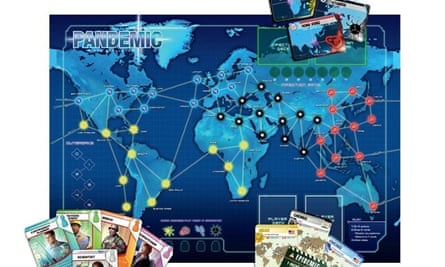
Space Cadets
The problem with games like Pandemic is the “alpha player” phenomenon. You might be one, even. Alpha players dominate a co-op game, essentially making it a single-player endeavour. Space Cadets negates that trap by giving different players distinct junior crew roles on a starship, and it makes for a gloriously collaborative experience.
Forbidden Island
Perhaps the most famed co-op game in recent years, this acclaimed tale of adventuring, treasure and an island slipping to the waves encourages players to talk through strategies, share goals and resist hogging the glory. It’s not immune to sparking arguments, but it delivers one of the most accessible, friendly co-op tabletop experiences.
Arithmetic
Camel Up
There exist numerous explicit maths games out there. Camel Up is not one of them. It is, however, the most recent winner of the main gong at Spiel Des Jahres– aka the “Oscars of board games”. Great for adults and kids alike, it’s a playful game of betting on racing camels, and while it’s certainly light, it gently floods the brain with odds and numbers.
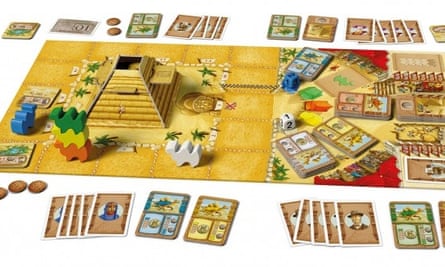
Lemonade Stand
You’re 12 years old, it’s time to save up for a new bike, and the pocket money has dried up. Which means establishing a driveway lemonade stand, and perhaps a move to American suburbia. This light-hearted game of economy, investment and business development stands in stark contrast to the numerically weighty economics titles out there, delivering a quick playing distraction to stimulate the grey matter before more a heavier-going number crunching endeavour.
Through the Ages
Galloping camels and citrus entrepreneurship too childish for you? Perhaps you’d like an economic game that offers six-hours sessions of managing politics, resources, housing, food, jobs, technology, culture, conflict and science over 2,500 years of human history? Then Through the Ages is the title for you. It is slow paced, complicated board game that can cause much analysis paralysis in players, but it certainly demands a great deal from the brai, and is hugely rewarding once mastered.
History
Memoir ‘44
This quick playing WWII-themed release is a military miniatures game, so expect working flanks and plastic tanks. It inhabits a gaming category dominated by far more convoluted beasts, and so is at the lighter end of the scale. Memoir ’44 presents a series of real battles from the D-Day missions, introducing each and striving to balance the odds dependant on real events from the time. It’s a great way to engage with history, rather than an accurate tome, and rules are available so as to take the game to the classroom.
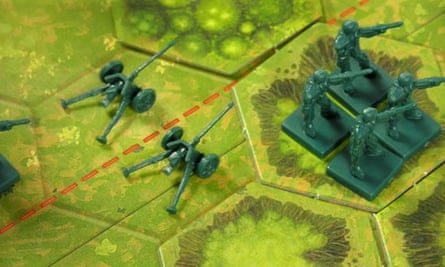
Twilight Struggle
If you fancy a more in-depth challenge than that offered by Memoir ’44, Twilight Struggle delivers a history of the Cold War as a remarkably well-regarded military game. It is fairly tough learning, and games often last hours, but through smart use of key historical happenings as gameplay changers, makes understanding the Cold War hugely engaging.
The Downfall of Pompeii
There’s more to human history than conflict; disastrous volcanic eruptions, for example. The Downfall of Pompeii takes its titular catastrophe and turns it into a superb family-friendly game with ample strategy. The goal is simple; escape Pompeii. It’s not a history lesson per se, but does a great job of bringing the story of Pompeii too life, and engenders considering the events of the famed natural tragedy.
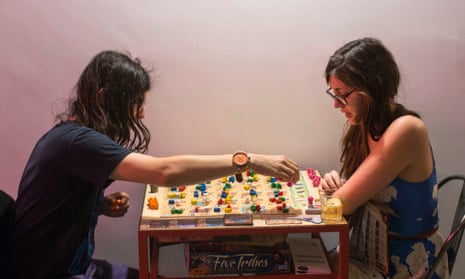



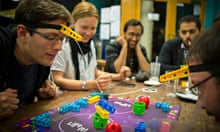




Comments (…)
Sign in or create your Guardian account to join the discussion